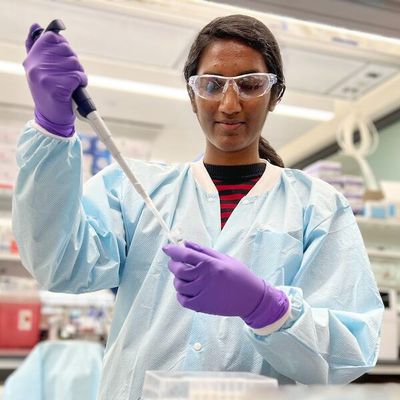- Undergraduate
Bachelor's Degrees
Bachelor of ArtsBachelor of EngineeringDual-Degree ProgramUndergraduate AdmissionsUndergraduate Experience
- Graduate
Graduate Experience
- Research
- Entrepreneurship
- Community
- About
-
Search
Overview
Britt Goods' research lies at the intersection of reproductive health, immunology, and biological engineering. Prior to joining Dartmouth, Britt received her PhD in biological engineering from the Massachusetts Institute of Technology. She subsequently was a postdoctoral fellow with Dr. Alex Shalek at the Broad Institute, the Ragon Institute and the Institute for Medical Engineering and Sciences.
Research Interests
Single-cell RNA-sequencing; reproductive health and cancer; contraceptive discovery; systems biology; immunology
Education
- BA, Biochemistry, Colby College 2010
- BE, Chemical and Biochemical Engineering, Dartmouth 2011
- PhD, Biological Engineering, Massachusetts Institute of Technology 2017
Awards
- NRSA Postdoctoral Fellow, 2017–2021
- Seibel Scholar, 2016
- National Science Foundation Graduate Research Fellow, 2013–17
- Howard A. 1925 and Florence Bellenot Schroedel Fellow, 2010–11
- Barry M. Goldwater Scholarship Honorable Mention, 2009
Professional Activities
- Member, Society for the Study of Reproduction
- Member, Society for Research in Human Milk and Lactation
- Kaufman Teaching Certificate Program (Fall, 2020)
- Advisory Board for Big Data Bioinformatics conference, Boston 2016
Selected Publications
- Gnecco JS, Brown A, Buttrey K, Ives C, Goods BA, Baugh L, Hernandez-Gordillo V, Loring M, Isaacson KB, Griffith LG. Organoid co-culture model of the human endometrium in a fully synthetic extracellular matrix enables the study of epithelial-stromal crosstalk. Med. 2023 Aug 11;4(8):554-579.e9. doi: 10.1016/j.medj.2023.07.004. PMID: 37572651.
- Zhang J*, Goods BA*, Pattarawat P, Wang Y, Haining T, Zhang Q, Shalek AK, Duncan FE, Woodruff TK, Xiao S. An ex vivo ovulation system enables the discovery of novel ovulatory pathways and non-hormonal contraceptive candidates. Biol Reprod. 2023 Jan 27:ioad009. doi: 10.1093/biolre/ioad009. Epub ahead of print. PMID: 36708230.
- Zhang J, Russo DD, Wang Y, Zhang Q, Zelinski MB, Shalek AK, Goods BA+,*, Xiao S+,*. Vitrification preserves follicular transcriptomic dynamics during ex vivo ovulation Vitrification preserves ovulatory transcriptome. Biol Reprod. 2023 Jul 27:ioad083. doi: 10.1093/biolre/ioad083. Epub ahead of print. PMID: 37498173.
- Chen YY, Russo DD, Drake RS, Duncan FE, Shalek AK, Goods BA+,*, Woodruff TK+,*. Single-cell transcriptomics of staged oocytes and somatic cells reveal novel regulators of follicle activation. Reproduction. 2022 Jul 7;164(2):55-70. doi: 10.1530/REP-22-0053. PMID: 35899878; PMCID: PMC9354060.
- Nyquist SK, Gao P, Haining TKJ, Retchin MR, Golan Y, Drake RS, Kolb K, Mead BE, Ahituv N, Martinez ME, Shalek AK*,+, Berger B*,+, Goods BA*,+. Cellular and transcriptional diversity over the course of human lactation. Proc Natl Acad Sci U S A. 2022 Apr 12;119(15):e2121720119. doi: 10.1073/pnas.2121720119. Epub 2022 Apr 4. PMID: 35377806; PMCID: PMC9169737.
- Cheng HD, Dowell KG, Bailey-Kellogg C, Goods BA, Love JC, Ferrari G, Alter G, Gach J, Forthal DN, Lewis GK, Greene K, Gao H, Montefiori DC, Ackerman ME. Diverse antiviral IgG effector activities are predicted by unique biophysical antibody features. Retrovirology. 2021 Oct 30;18(1):35. doi: 10.1186/s12977-021-00579-9. PMID: 34717659; PMCID: PMC8557579.
- Wang Y, Drake RS, Russo DD, Pattarawat P, Zhang Q, Zelinski MB, Shalek AK, Goods BA, Xiao S. Vitrification preserves murine ovarian follicular cell transcriptome in a 3D encapsulated in vitro follicle growth system. Biol Reprod. 2021 Dec 20;105(6):1378-1380. doi: 10.1093/biolre/ioab185. PMID: 34591115; PMCID: PMC8689290.
- Goods BA*, Askenase M*, Markarian E, Beatty HE, Drake R, Matouk CC, Awad IA, Zuccarello M, Hanley MD, Love JC, Shalek AK, Sansing LH. Leukocyte dynamics after intracerebral hemorrhage in a living patient. JCI Insight (2021) https://insight.jci.org/articles/view/145857
- Askenase M*, Goods BA*, Beatty HE, Steinschneider AF, Osherov A, Landreneau MJ, Carroll SL, Tran TB, Avram VS, Drake RS, Massey JA, Karuppagounder SS, Ratan RR, Matouk CC, Sheth KN, Awad IA, Ziai W, Zuccarello M, Thompson RE, Lees KR, Hanley DF, Love JC, Shalek AK, Sansing LH (for the MISTIE III Consortium and the ICHseq investigators). Longitudinal transcriptomics define the stages of myeloid activation in the living human brain after intracerebral hemorrhage. Science Immunology (2021) vol. 6, pp. 1-26. https://immunology.sciencemag.org/content/6/56/eabd6279/tab-e-letters
- Goods BA*, Lowther DE*, Hernandez AL*, Lucca LE, Lerner BA, Raddassi K, van Dijk D, Duan X, Gunel M, Coric V, Krishnaswamy S, Love JC, Hafler DA. (2017) Functional Differences Between PD-1+ and PD-1– CD4+ Effector T Cells in Healthy Donors and Patients with Glioblastoma Multiforme. PLOS ONE 12(9); e0181538.
- Ozkumur AY*, Goods BA*, Love JC. Development of a High-Throughput Functional Screen Using Nanowell-Assisted Cell Patterning. Small. (2015) Sep;11(36):4643-50. doi: 10.1002/smll.201500674. Epub (2015) Jun 29.
- Cao Y*, Goods BA*, Raddassi K, Nepom GT, Kwok WW, Love JC, Hafler DA. Functional inflammatory profiles distinguish myelin-reactive T cells from patients with multiple sclerosis. Sci Transl Med. (2015) May 13;7(287):287ra74. doi: 10.1126/scitranslmed.aaa8038.
Videos
Biology: Dartmouth Precollege Online Program
News







